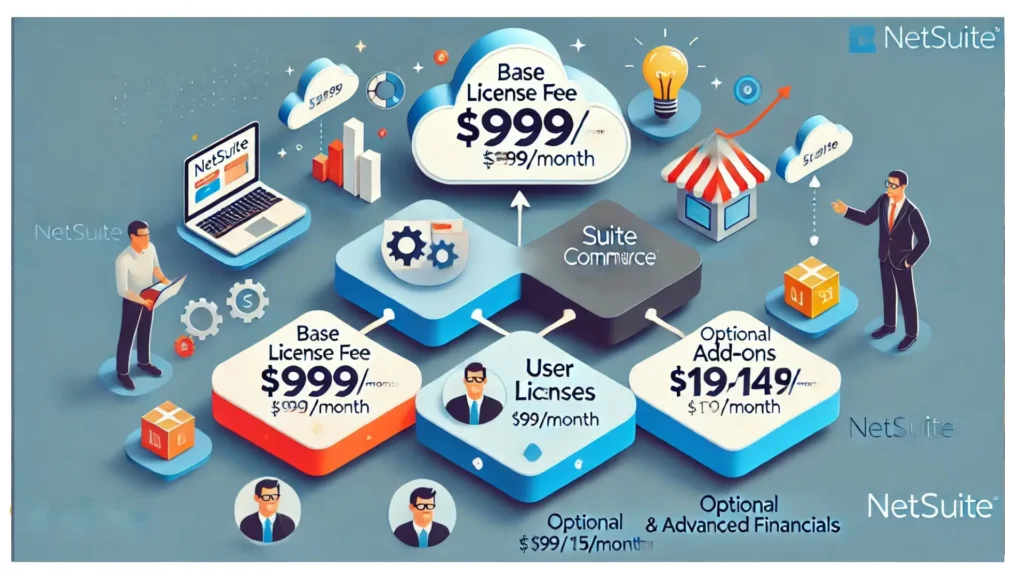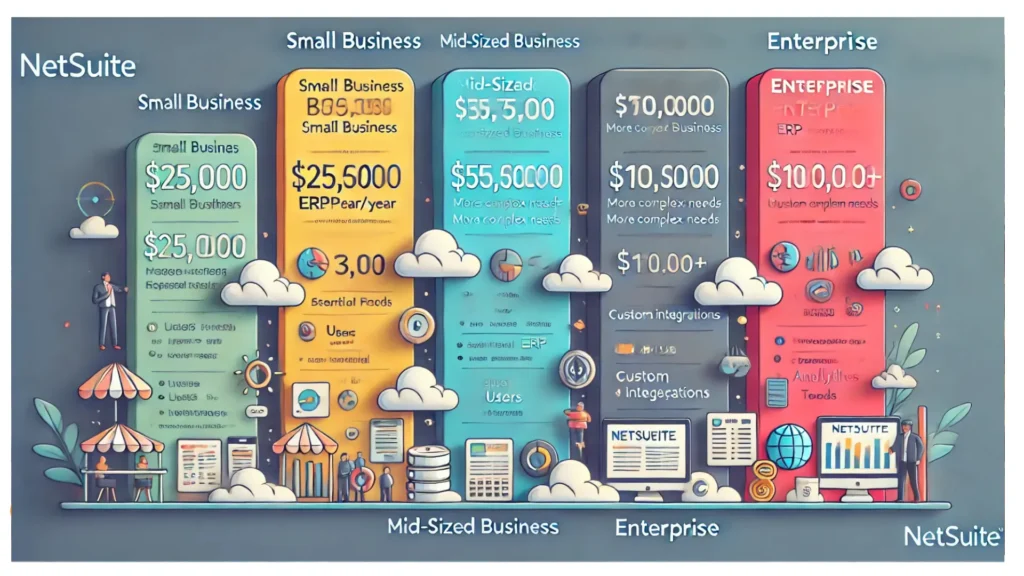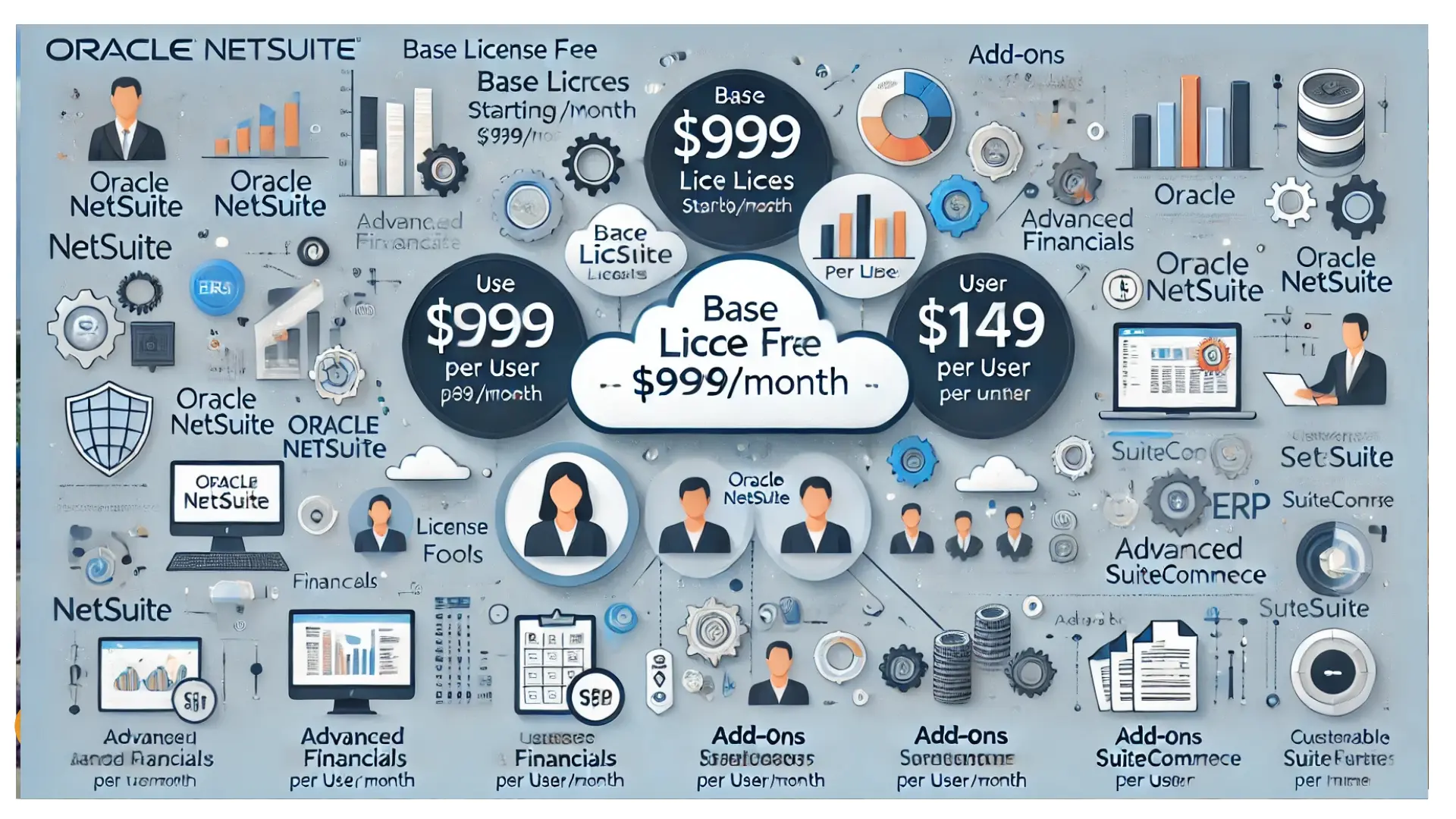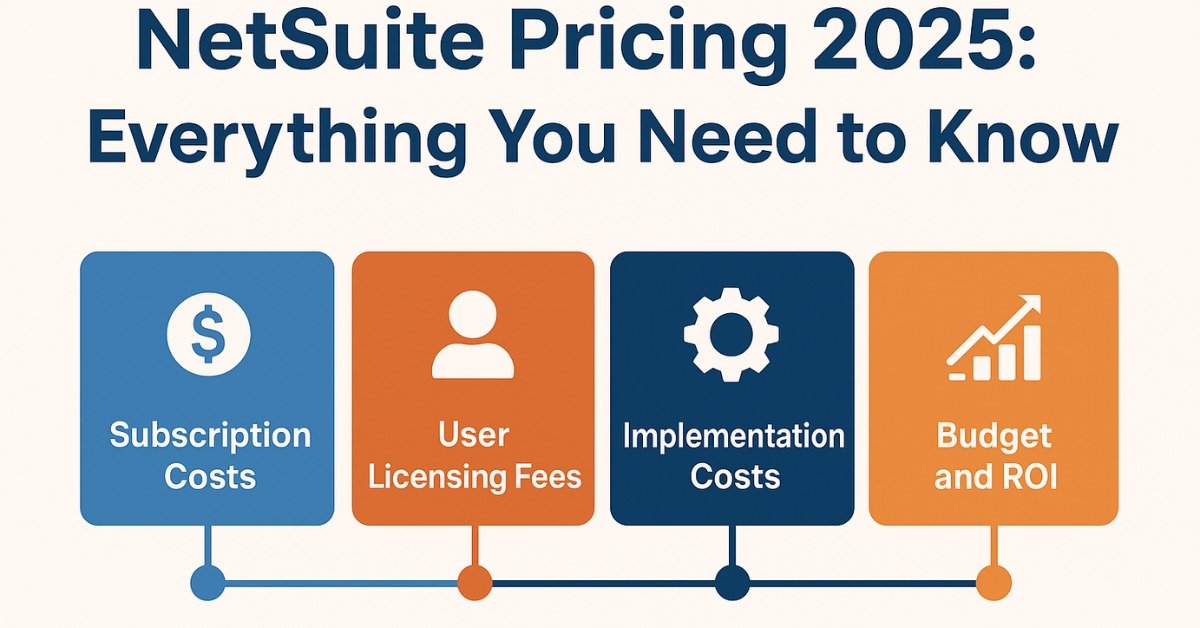When considering Oracle NetSuite for your organization, it is important to know the pricing. As one of the leaders in cloud-based Enterprise Resource Planning (ERP) solutions, NetSuite provides the most powerful business tools for businesses of all sizes – financial management, CRM, e-commerce, and so much more. However, there is a considerable difference in adopting NetSuite from one organization to another due to several reasons, including the size of the business, number of users, and modules being used.
This guide delves into NetSuite’s pricing model, its key components, and how to estimate costs for your organization.
Table of Contents
ToggleHow NetSuite Pricing Works
NetSuite operates on a subscription-based pricing model designed to cater to the unique needs of businesses. The pricing structure comprises three key elements: the base license fee, user licenses, and optional add-ons or advanced modules. Each of these components plays an important role in determining the overall cost, allowing businesses to tailor the platform to their specific requirements without overcommitting to unnecessary features. Flexibility is one reason why NetSuite is an attractive choice for startups, midsize companies, and large enterprises.
- The base license fee is the foundational cost of gaining access to the NetSuite platform. It’s an annual charge covering the main functionalities of the system, such as ERP core features like financial management, supply chain operations, and basic reporting tools. The base fee starts at about $999 a month and may vary according to the complexity of your business and scope of operations. Small businesses may find this cost manageable as it consolidates many operational needs into one platform, whereas larger organizations with intricate requirements might see higher starting prices due to their need for greater customization.
- User licenses are another integral aspect of NetSuite pricing. These licenses are charged per user, ensuring that the cost scales with the number of employees who require access to the system. For example, a small business with just a few users will pay much more less than a multinational with hundreds of employees accessing it across departments. The prices per user are usually from $99 to $149 for a month. This model forces firms to strategize on allocation of roles and ensure only few people have access to it thereby maximizing cost-effectiveness.
- Beyond the base fee and user licenses, it offers optional add-ons or advanced modules for customization. Modules like Advanced Financials, SuiteCommerce, and Supply Chain Management cost extra and can be integrated, depending on the needs of an organization. These modules are essential for businesses that require certain functionality beyond the standard ERP functions to operate. These add-ons range from a few hundred dollars per month for some modules to others that can be in the millions.
Oracle NetSuite pricing: A Comprehensive Guide
Understand how the company structures its pricing as part of the evaluation of Oracle NetSuite for your organization. As the premier cloud-based Enterprise Resource Planning solution, NetSuite equips businesses of all sizes with rich functionalities that range from financial management and CRM to e-commerce, and many more. Nevertheless, the cost of adopting NetSuite is not fixed but is very dynamic depending on various factors like business size, the number of users, and required modules.
The report digs deep to address the pricing model of NetSuite, its key parts, and how to determine costs for your organization.
Understanding the Pricing Structure at NetSuite
NetSuite applies a subscription-based pricing approach as specific to the needs of various businesses. The three most primary elements of the pricing structure consist of the base license fee, the user licenses, and some optional add-ons or modules. All of these constituent parts are essential to providing the final cost and, because of this, help enable businesses to configure the platform according to their needs without committing to unnecessary applications. This flexibility is particularly appealing to startups, as well as midsize and enterprise companies.

Base License Fee - The Core Cost of Access
The base license fee sets the base cost for allowing access to the NetSuite platform. It is an annual charge to the core functionalities of the system, which include essential ERP features like financial management, supply chain operations, and basic reporting tools. The base fee starts from about $999 per month and can increase based on the complexity of your business and the scope of operations. Small businesses may find this cost acceptable because it integrates so many operational needs into one platform, whereas larger organizations with more complex needs will see higher starting prices due to their need for greater customization.
User Licenses: Scaling with Your Team
User licenses are another key component of NetSuite pricing. These licenses are priced per user, so the cost scales with the number of employees who need access to the system. For example, it will cost a small firm with just a few users, much less than it would a multinational company with hundreds of users accessing NetSuite from all parts of the organization. The basic price per user ranges from $99 to $149 monthly. This model will, of course, make companies think beforehand and assign roles, having only the necessary users authorized, thereby maximizing efficiency at a lower cost.
Available Add-ons: Customize Your NetSuite
Beyond the base fee and user licenses, NetSuite offers further optional add-ons and advanced modules to customize their experience. Such modules include Advanced Financials, SuiteCommerce, and Supply Chain Management where organizations can purchase them for an added fee. These modules are particularly handy for businesses that experience certain operational needs extending beyond their usual ERP functionalities. The costs of these add-ons fluctuate greatly, with some modules costing a few hundred dollars per month, and others significant investments. Businesses should evaluate these modules based on immediate and long-term operational goals to make sure they are selecting features that deliver quantifiable value.
Implementation Cost: More than Subscriptions
Implementing NetSuite is another significant cost component that organizations should consider. While the software is provided by NetSuite, an effective implementation often requires the hiring of implementation partners or consultants. These individuals will help with system configuration, data migration, and user training. The cost of implementation can be anywhere from $10,000 for small businesses with relatively simple needs to over $100,000 for large enterprises with more complex requirements. These one-time expenses, though substantial, are an investment in ensuring the platform is optimized for your business processes from the outset.
Factors Influencing NetSuite Pricing
The final price of NetSuite to a business depends on various factors. Organization size, industry, and the need for customization all play huge roles. For instance, a manufacturing business would require supply chain and inventory management modules, whereas a service-based company may focus more on CRM and project management tools. Seasonal offers, multi-year discounts, or bundles can also affect the final price, thereby providing options for saving costs.
NetSuite Pricing for Small and Midsize Businesses
For small and mid-size businesses (SMBs) in particular, NetSuite is scalable, growing with the evolution of the needs of the business. Even though the cost upfront is much higher than typical entry-level software, the saving realized in consolidating multiple business operational systems into one platform provides justification for the investment to be made. SMB’s pay around $25,000 to $75,000 per year on this.

NetSuite Pricing for Enterprise Business
Enterprise businesses that are based in multiple locations across the globe require deep customizations, which raises the price of the investment significantly. These companies tend to install many modules, integrate third-party applications, and support hundreds of users, which pushes costs upwards of $100,000 annually. However, the platform is known for streamlining operations between regions and departments, making this investment often outweigh costs.
Is NetSuite Worth It?
The cost of NetSuite can be high when viewed from the outside, but the full package and scalability of its features are well worth the investment for most businesses. It will increase efficiency and make better decisions through the centralization of operations, automation of repetitive tasks, and actionable insights from NetSuite. Organizations should make a thorough cost-benefit analysis to decide whether the platform is aligned with their operational goals and budget.
Conclusion: Making an Informed Decision
Understanding the pricing structure for NetSuite is important in business, especially when considering a powerful ERP solution. Even though costs may vary depending on company size, number of users, or modules needed, the platform’s flexibility ensures that even the smallest organizations can take advantage of its features. With close attention to your needs and possibly with the help of representatives or partners from NetSuite, you can create a tailored plan that maximizes value while staying within budget.



